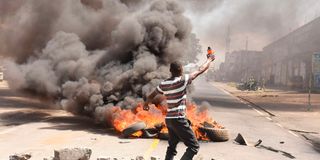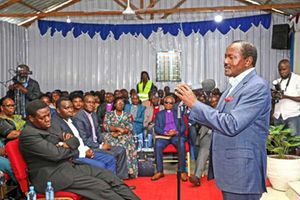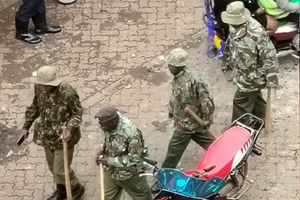
A protester holds a teargas canister besides a bonfire on July 19, 2023 during an anti-government protest.
Organisers of demonstrations and protests will be held responsible for damage of property if a proposed law sails through.
The Assembly and Demonstration Bill, 2024 further proposes that organisers of any protests or demonstrations shall be required to pay clean-up costs.
Lawyers view the Bill by Mbeere North MP Geoffrey Ruku as not only punitive but one that unfairly takes away the right of Kenyans to express their grievances as envisioned by the drafters of the Constitution.
“Article 24 of our Constitution allows for reasonable and justifiable limitations. The Bill as proposed does not consider this provision. It, should, therefore be looked afresh before being debated in Parliament,” said lawyer Charles Kanjama.
The Bill notes that any person intending to hold an assembly must notify the regulating officer in advance and also give the officer the power to impose conditions on the carrying out of an assembly or demonstration, and such conditions may relate to public safety, maintaining public order or protecting the rights and freedoms of persons.
Spontaneous demonstrations
This requirement, according to Mr Kanjama, is ignorant of the Constitution, which recognises that demonstrations can be planned or spontaneous.
“When the Bill demands that organisers of demonstrations write to police at least three days in advance, it automatically locks out spontaneous demonstrations. People can just wake up and decide that they are fed up with an issue of public interest. Asking them to write at least 72 hours in advance takes that right away from them,” said Mr Kanjama.
He also has an issue with a requirement that the organiser of an assembly or demonstration or his authorised agent shall be present throughout the assembly and shall assist the police in the maintenance of peace and order.
“I have no issue with the organiser or their authorised agent(s) to be present throughout. However, giving civilians the duty to help police maintain peace and order does not make sense. The duty of maintaining peace and order belongs to the police,” said Mr Kanjama.
The lawyer says whenever there are demonstrations or protests, third parties usually infiltrate them, noting that asking organisers to maintain peace and order will discourage Kenyans with genuine grievances from organising such demonstrations and assemblies.
The Bill also lays the blame squarely on the organisers of demonstrations for loss or damage of property.
“Where, during the carrying on of an assembly or demonstration, damage to property occurs as a result of the assembly or demonstration, every organisation and every person participating in such assembly shall, subject to subsection (2), be jointly and severally be liable for such damage,” it says.
This, Mr Kanjama, says can be misused by opponents of such demonstrations to put the blame on organisers.
Discipline
When Mr Ruku proposed the Bill last year during the Azimio demonstrations, he said that the punitive proposals were meant to instil discipline during protests.
“You can’t destroy property in the name of demonstrations. We can't have loss of lives in the name of demonstrations. For peaceful demonstrations to be achieved, there must be regulations,” he said.
However, lawyers and governance analysts say the MP overlooked the fact that government and other interested parties can take advantage of the proposed law to paint organisers in a bad light.
During demonstrations against the Independent Electoral and Boundaries Commission (IEBC), the then ruling coalition unleashed a group that was known as Nairobi Business Community ostensibly to protect their businesses and property.









